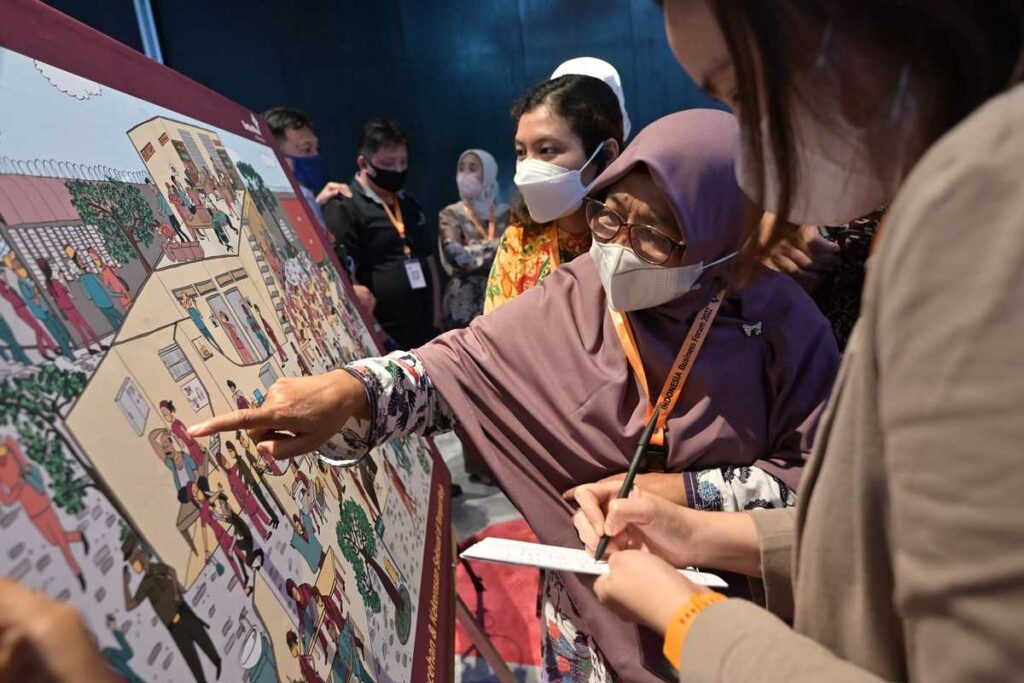For the first time in almost three years, Better Work Indonesia again welcomed the Indonesia Business Forum (IBF) 2022 after the nation experienced the full impact of the COVID-19 pandemic and the enactment of the Indonesian Job Creation Law.
The forum also coincided with the tenth anniversary of the Better Work programme in Indonesia. Over 150 participants representing Better Work’s international buyer partners and participants, agents, group manufacturers, licensees, vendors and national stakeholders took part online and in person in the IBF 2022 on 8 December in Jakarta.
This year, the IBF showcased the impact of collective efforts undertaken by workers, employers, international brands and other industry stakeholders through the launch of The Impact of BWI: A 10-Year Reflection report. The report details the Indonesian garment sector’s significant gains in compliance with labour regulations and standards as well as examines areas where persistent non-compliance continues to be an issue. For instance, around 45% of persistent non-compliance reported in factories is related to overtime payment.
“Even [while] facing significant challenges, many compliance issues have been improved with the strengthening of collective bargaining [and] improvement of working conditions,” said Michiko Miyamoto, the ILO’s Country Director for Indonesia and Timor-Leste, in her opening address.
The final session of the forum emphasized the need to collaborate to achieve a more robust and equitable ecosystem for the entire industry through a better and shared framework to address the status quo.
Tripartite panel discussion: A reflection on Indonesia’s export-oriented garment industry and way forward
A panel discussion titled Post-COVID-19 and the Job Creation Law: Labour and Economic Challenges and the Way Forward for Indonesia’s Garment Sector highlighted possible future risks in anticipation of a potential wave of economic crisis. The panel featured tripartite representatives from the industry, such Anne Patricia Sutanto, Vice Chairperson of API and Board Member of APINDO’s Advisory Board, Djoko Heriyono, Chairperson of SPN-KSPI who represented trade unions in the sector, Surya Lukita Warman, Secretary of the Indonesian Government’s Directorate General for Industrial Relations Ministry of Manpower, and Faisal Basri, a leading economist from the University of Indonesia who provided an overview of the industry and its economic situation.
“Perhaps [the audience] already knows that the industries with the highest growth Q1 to Q3 this year were the textile and garment sectors,” said Basri. “Fashion and the garment sector were the most impacted [by the COVID-19 crisis], but they recovered the fastest,” he added.
Sutanto of API and APINDO said that Indonesia’s garment industry could withstand the economic downturn caused by the pandemic because of automation, adaptation and collaboration with the labour force. “Our sector survives and thrives because we, together with our unions or partners, work together to continue producing top-quality products for this industry,” she said.
Enabling sexual harassment and workplace violence-free workplaces
The forum also put the spotlight on sexual harassment and violence at work. In an interactive session, participants were asked to identify acts of sexual harassment from a poster presenting common risks from daily situations faced by workers in the garment sector. This activity reflected the real inputs of garment workers provided to Better Work Indonesia during sessions of the Respectful Workplace Programme (RWP) training. The message was clear: sexual harassment can occur in all departments, and perpetrators and victims can be anyone working at the factory.

“One of the key issues we focus on is the reduction of workplace violence,” Miyamoto said earlier in the day.
Later in the day, participants learned about factories’ progress in the RWP, as efforts to institutionalize the prevention and handling of sexual harassment and violence at work continue.
Several factory representatives explained their efforts to provide training and as well as undertake awareness raising campaigns in the context of the RWP programme. They also discussed how they established grievance mechanisms related to sexual harassment and workplace violence and set up relevant policies and procedures.
The forum also provided those attending in person with a Virtual Reality (VR) experience on sexual harassment prevention and handling – a new way to experience self-learning on sexual harassment. The VR experience is designed to promote individual behavioural changes and provide an opportunity to review company policies and mechanisms.
“Year-end reflections on achievements in 2022, with ten years of programme existence and future industry challenges, were summarised and presented very nicely in a one-day event,” said Andi Zuhri of Columbia Sportswear. “[It was] not only fruitful, but also fun!” he added.